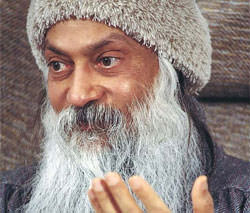About Osho
Never Born – Never Died – Only visited this planet Earth between December 11, 1931 and January 19, 1990. With these literally immortal words, Osho both dictates his epitaph and dispenses with his biography. Having previously removed his name from everything, he finally agrees to accept "Osho," explaining that it is derived from William James' "oceanic." "It is not my name," he says, "it is a healing sound."
His thousands of hours of extemporaneous talks, spoken to people around the world over a twenty year period, were all recorded, often on video, tapes, CDs, DVDs and downloads that can be listened to anywhere by anyone, when, Osho says, "that same silence will be there."
The transcriptions of these talks are now published in hundreds of titles in dozens of languages.
In these talks, the human mind is put under the microscope as never before, analyzed to the smallest wrinkle. Mind as psychology, mind as emotion, mind as mind / body; mind as moralist, mind as belief; mind as religion, mind as history, mind as politics and social evolution – all examined, studied, and integrated. Then graciously left behind in the essential quest for transcendence.
In the process Osho exposes hypocrisy and humbug wherever he sees it. As author Tom Robbins so eloquently puts it:
I recognize the emerald breeze when it rattles my shutters. And Osho is like a hard, sweet wind, circling the planet, blowing the beanies off of rabbis and popes, scattering the lies on the desks of the bureaucrats, stampeding the jackasses in the stables of the powerful, lifting the skirts of the pathologically prudish and tickling the spiritually dead back to life.
Jesus had his parables, Buddha his sutras, Mohammed his fantasies of the Arabian night. Osho has something more appropriate for a species crippled by greed, fear, ignorance and superstition: he has cosmic comedy.
What Osho is out to do, it seems to me, is pierce our disguises, shatter our illusions, cure our addictions and demonstrate the self-limiting and often tragic folly of taking ourselves too seriously.
So what to say of Osho? The ultimate deconstructionist? A visionary who becomes the vision? Certainly a proposal to existence -- that it is everyone's birthright to enjoy that same oceanic experience of true individuality. For that, Osho says, "There is only one path, which goes inwards, where you will not find a single human being, where you will only find silence, peace."
A conclusion? There are no full stops in the Osho vision, but a helping hand towards understanding ourselves:
I would like to say to you: Science is the ultimate value. And there are only two kinds of sciences: one, objective science, that decides about the outside world; and two, subjective science, which up to now has been called religion.
But it is better not to call it religion. It is better to call it the science of the inner, and to divide science into a science of the outer, and a science of the inner – objective science and subjective science. But make it one solid whole, and science remains the ultimate value – nothing is higher than that.
